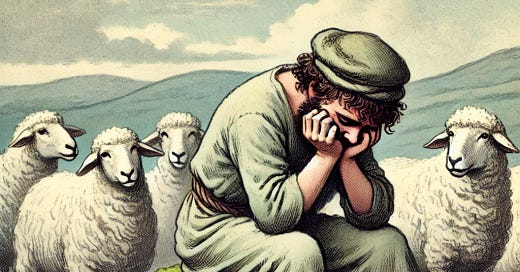Shepherds: The Eternal Far-Group
Robin Hanson has written on the difference between in-groups, out-groups, and far-groups. The in-group are the people we see as our friends and collaborators, who we work together with for mutual advantage. The out-group are the people - and of course groups of people - who our in-group is in competition with. And the far-group are groups of people who we are neither directly cooperating with nor directly competing with, indeed we simply have little to do with. We tend to think positively about our in-group, negatively about our out-group, and in frankly bizarre ways about our far-groups.
If this analysis is correct, or at least helpful, perhaps the group which has most often served as the far-group for the writers who survive to us through history is shepherds. Shepherds would spend the majority of the year out in the countryside with their flocks, moving between different pastures; at market-time, they would walk with their flocks to the town in order to sell their livestock. This meant that their contact with literate city-dwellers was often quite limited, enabling poets to project all kinds of romantic tropes onto them. In particular, shepherds came to be associated with musicianship and romantic longing.
An early example would be Achilles’ shield, the subject of lengthy description in book 18 of the Iliad, which portrays (among many other things) shepherds playing on pipes. Later, Virgil’s Eclogues are a set of poems in which shepherds sing learned songs about politics, heartbreak, and theology. Most famously, shepherds appear alongside the magi of the east in order to greet the newborn Christ; nowadays we are accustomed to see this as a meeting of the highest and the lowest in shared worship, but perhaps at the time of writing the shepherds were little rarer a sight than the wise men.
It is, in principle, possible that these stories are based on genuine experiences of shepherds. To be especially generous - shepherds in ancient Rome and the near East would in some cases have possessed sheepdogs, and plausibly used pipes of some kind as a kind of dog whistle. But in societies where GDP was close to zero and people lived generally at subsistence level, I think it is more plausible that these stories are 95% exaggeration and invention based on little or any actual encounter. It is particularly to take seriously the densely-allusive language attributed to the shepherds by Virgil:
Then you might have seen Fauns and wild creatures dance
to the measure, then the unbending oaks nodded their crowns:
no such delight have the cliffs of Parnassus in their Phoebus,
Whether due to the continued isolation of shepherds, or simply the long shadow of Virgil’s poetry, this imagery continued into the early modern era. Don Quixote urged Sancho Panza that they should leave chivalry behind and take up shepherding:
“God bless me, Sancho my friend!” said Don Quixote, “what a life we shall lead! What hautboys and Zamora bagpipes we shall hear, what tabors, timbrels, and rebecks! And then if among all these different sorts of music that of the albogues is heard, almost all the pastoral instruments will be there.”
And when Christopher Marlowe was writing of love, he of course reached for the image of a shepherd. Like so many of his predecessors he attributed fanciful levels of wealth to the shepherd, who promised his love:
A gown made of the finest wool
Which from our pretty lambs we pull;
Fair linèd slippers for the cold,
With buckles of the purest gold;
Finally, Thomas Hardy never found a romantic trope he couldn’t turn into a parade of misery. His shepherd Gabriel Oak takes out a considerable loan to buy a flock of sheep and a sheepdog, and immediately falls in love with his beautiful neighbour, only for her to leave town and the dog to chase the sheep off a cliff, landing poor Gabriel in utter penury.




